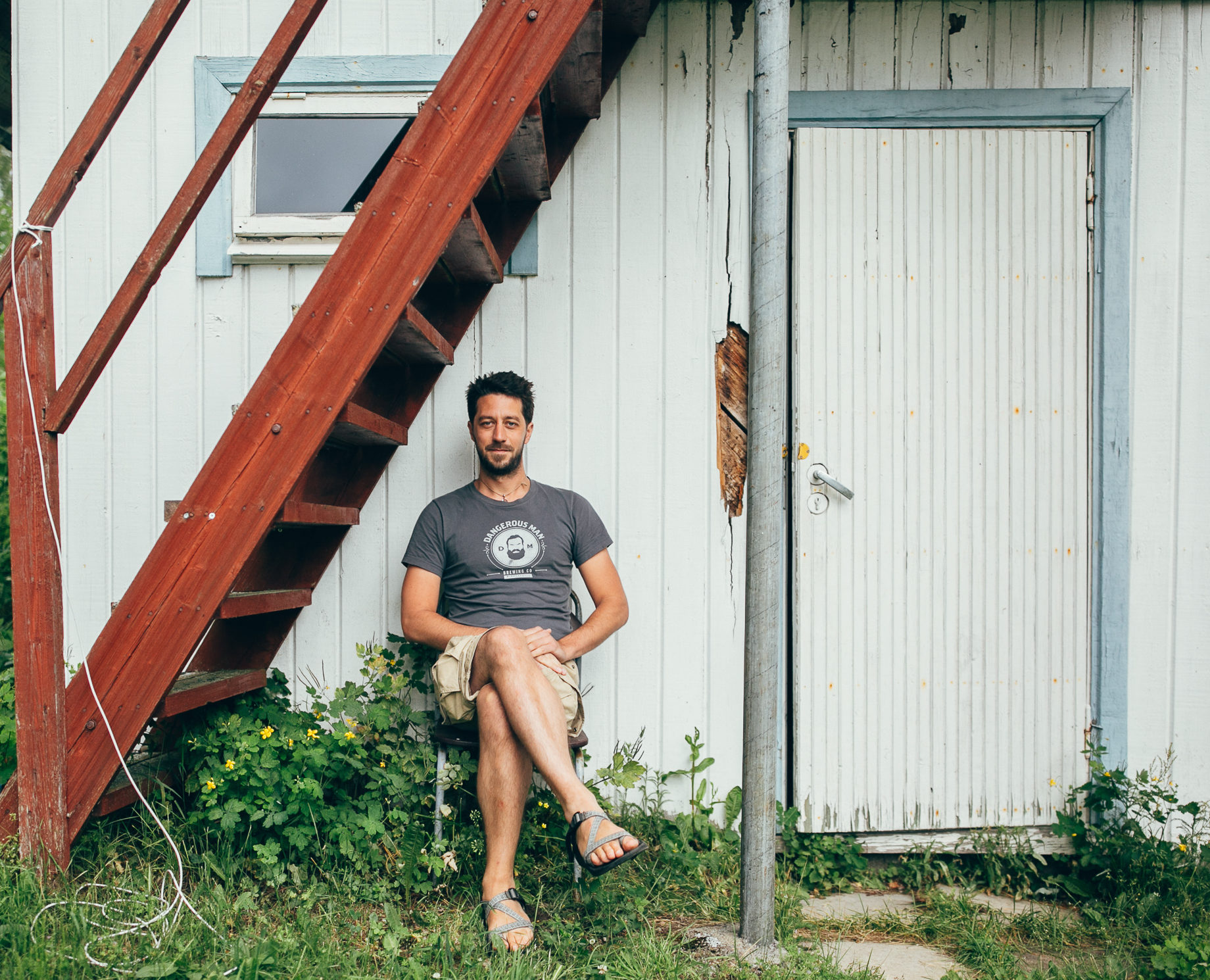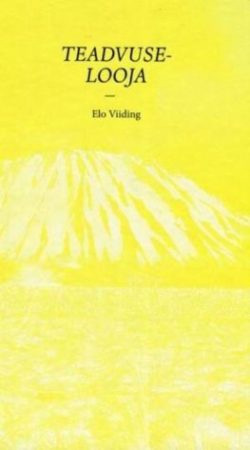Adam Cullen (31) is a translator and poet from Minnesota. He first came to Estonia in 2006, somewhat incidentally and with his sights set merely on travel. Nevertheless, he was mesmerized by the local language, and moved to Estonia the very next year. Now, in less than a decade, he has become a prolific translator of Estonian literature into English. And he’s just getting started! Cullen is certainly one of the most valuable ambassadors of Estonian literature to the world – a title he himself never flaunts, of course. He is a humble and hard-working littérateur who plays the violin, sings in an Estonian mixed choir, battles hazelnut trees encroaching upon his coastal summer home, and is continually mindful of taking the time to breathe.
First things first – what is your first vivid memory of Estonia?
I first arrived here on a foggy, gloomy day. The weather wasn’t even nice… which I suppose didn’t give me any false expectations! I can still remember the view from my hotel window – Tallinn’s skyline was different back then. But at the initial moment I heard the Estonian language, everything was already decided for me, on some level. The language felt like an open door. I moved here the next year, and started learning Estonian through immersion. Still, I really had no idea I’d become an Estonian translator, it just happened somehow. I met Ilvi Liive and Kerti Tergem from the Estonian Literature Center at a Finno-Ugric nonprofit organization’s Christmas party, and that’s how it all began. I don’t have a degree in literature, as most translators do. I did, however, graduate from university in Global Studies (however that can be explained!) and in Russian language and culture. At first, I joked that the reason I started translating Estonian was that I was trying to make a career out of obscurity. And that was true, in a way; but then again, it wasn’t at all, because it’s something that utterly fascinates me to this day. I can talk about it for hours, and can bore you to death with how incredible I find the Estonian language.
Although you’re a fluent Estonian speaker, we’re conducting this interview in English. You’ve also lived in Russia and speak Russian fluently. How do you define or see yourself within these different languages and cultures?
I suppose I do have a slightly different personality and identity in different languages. My Minnesotan side is different from my Estonian side, for sure. My Estonian ego is probably more reserved, because language inherently contains culture, and to practice a language, you have to participate in the culture. My Russian personality is very intense, so it’s great that I found Estonia and can nurture this calm Nordic side of my identity. If I were living Russia and working as a Russian translator, then it’d be a very different life. I do love Russian humor and culture, and all the warmth that lies behind it. Not to say that Estonian lacks that, it’s just very different. I actually do still have a hard time putting certain things into words when it comes to Estonia and Estonians – and this after almost a decade of living here. For me, It’s as elusive as speaking English with an Estonian accent. I can do a Finnish accent, and I can do a Russian accent, no problem, but I just can’t seem to put my finger on the Estonian one! It’s like the legend of the Old Man of Lake Ülemiste, Ülemiste vanake – if the building of Tallinn is ever finished, Ülemiste vanake will rise up and flood it. If I ever get an Estonian accent down in English, then I guess it’ll be the end of my time here. There is one recurring question that I find a bit baffling – people still ask me: “So, you think you’re gonna stay here?” And that after ten years! It must have to do with some deep-rooted psychological elements that I can’t explain. Something about the Estonian psyche.
So, the author’s voice vs. the translator’s voice – how would you describe the relationship between the two?
I really enjoy how Estonia is beautifully small and quaint enough that you can speak to living authors and get to know them well. Many of the authors I’ve translated are now friends, and thanks to this, I feel like I’m in a way more competent when expressing their voice; that I have their trust and can avoid false attributions. It’d be a whole different story if I were only able to research the author online, scrolling through whatever’s on Wikipedia, thinking, “Oh, that’s what they must be like.” The conclusions you draw about the author and about who they are in real life are very different, as is trying to commit that into character voices or the structure of their language. But by having this personal knowledge and these interactions, it is acting, in a way – a sort of character study. You get to be around them and see how they react in new situations and their different patterns, but at the same time, they might do just what you’d expect. I suppose the greatest compliment a translator can get from an author is when they say: “I feel like I wrote this in this language myself. Channeled through you.” Still, I think it’s impossible for a translator to completely disappear from a text. Every translator retains his or her own faint style: we’re not removable from what we write, but at the same time, it’s possible to strike a balance. A kind of harmony. I think that’s the sign that something’s going right.
Your own literary debut, the bilingual poetry collection Samblik / Lichen, was published early this year. So, what’s the story behind your own writing? Did you always know it was going to happen one day?
No, I had absolutely no idea. It was as unexpected as was becoming a translator in its own time. I’d been translating poetry for quite a while, but really never wrote any myself. But then, I went through a very difficult time in my personal life, and I guess I needed to get those emotions out somehow – so I put them on paper, which is a safe place. Of course, I don’t just write about horrible, dark things. But it turns out your inner levels of cliché will always keep surprising you, I guess! I’m really pleased that my book is between covers now, and is out living its own life. In a way, I see it like a time capsule – it has poems that preserve the truth about the moment in which they were written, but those are gone now. I haven’t pushed them away or anything; they just walked off so that newer ones can have room to enter. I actually read more newer poems at the book release, not just ones in the collection – people can read those on their own. At the same time, I do feel it’s worth seeing poetry performed by the actual poet – in its true living colors, with all their preferred pauses and emphases. I think that’s the most genuine expression of poetry after it’s written – performance. But the written word itself is a great way to gain perspective of the possibility of change. You can see how you’ve developed or transformed when you go back to it later on. That also goes for translation – when something I translated in the past isn’t exactly to my liking now, I still know that that was me back then. It’s truth.
What is your work process like? Do you have any special habits?
I prefer working outside – I “set up” my office outdoors whenever I can. And sometimes I’ll translate by hand, though not very often, because I’m usually under a lot of deadline pressure and it takes more time. But I do like translating poetry by hand, especially since it allows you to be so much more intimate with the text. And you put more thought into writing when you do it manually, in general – even if there are a ton of cross-outs, or especially so! I do my own writing by hand as well. I’ve always got a notebook with me. Sometimes, I’ll just write little snippets; other times, a whole poem, either of which I’ll digitalize later and then expand or polish. Sometimes, that physical form is the end of the road for them. I like working and writing in the evening, for the most part – that’s when my brain actually starts waking up and operating at a decent capacity.
How do you handle the intensity of being one of the few people who do what you do?
Well, hopefully I’ll scrape enough money together someday to build a little sauna out in the woods in western Estonia. And I would like to have more of an opportunity to travel, though it’s hard making dreams like that come true as a freelance translator of Estonian lit! Still, I’m generally content with the way things are – I’m not too needy. I do get a little worn out by the insane tempo life’s taken these days – everything is always a rush. I doubt it’ll ever regress again, but it’s important to find ways to separate yourself from work or passion, if only for a few hours. Being capable of doing something or being good at it doesn’t mean you have to do it frenetically or work yourself to death. It’s all about creating a balance. One comics artist compared it to breathing – when you create art or do anything productive, you’re breathing out. Still, you can’t breathe out endlessly. Breathing in means experiencing other art, doing other things, or even just doing nothing. And you can’t judge yourself for taking the time to breathe in – it’s essential for you to breathe out again, not a weakness. Depending on the situation, it’s good to not try to answer every e-mail immediately or agree to do things overnight or on weekends, even (or especially) as a freelancer. That way, people get accustomed to the fact that you as a person need to breathe out, and hopefully, it’ll give them a chance to do the same.




